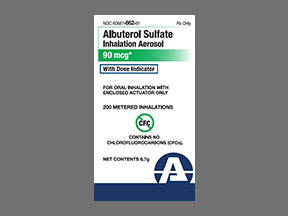
Albuterol Sulfate Hfa Coupons & Savings Card – Discount Prices from $35.79
Generic for: Proventil hfa, Ventolin hfa, Proair hfa
Albuterol, also known as salbutamol, is a fast-acting medication used to treat wheezing and shortness of breath caused by conditions such as asthma. It is classified as a bronchodilator, which means it works by relaxing the muscles around your airways, helping them to open up so you can breathe more easily. This medication is intended for quick relief and is often referred to as a rescue inhaler. Suitable for adults and children aged 4 years and older, it is typically inhaled through either an HFA or dry powder inhaler. The usual dosage is two inhalations every 4 to 6 hours as needed during sudden breathing difficulties. Albuterol can also be used to prevent exercise-induced asthma. Common side effects may include sore throat and throat irritation. Always consult with a healthcare professional before starting any new medication to ensure it is appropriate for your specific condition.
Our coupons are free to use. Before paying, show the pharmacist your Albuterol Sulfate Hfa savings card to get your free discount. Use our filters below to edit the prescription box to match your needs. The Albuterol Sulfate Hfa prices will update based on your prescription needs. Above our Albuterol Sulfate Hfa coupons, you can change your location to see pharmacy prices and costs in other areas. We're here to help you buy Albuterol Sulfate Hfa at the lowest price with our prescription discount card.
My prescription
Edit
18GM of 108 (90 Base)MCG/ACT, Albuterol Sulfate Hfa (1 Inhaler)
Select pharmacy

CVS
$39.82
COUPON PRICE
Walmart
$35.79
COUPON PRICE
Albertsons
$42.15
COUPON PRICE
Walgreens
$46.01
COUPON PRICEAlbuterol Sulfate Hfa savings card
Show this card to your pharmacist
Walmart
$35.79
BIN
ID
PCN
GRP
019876
LH749257FA
CHIPPO
LHX
Powered by
Albuterol, also known as salbutamol, is a fast-acting medication used to treat wheezing and shortness of breath caused by conditions such as asthma. It is classified as a bronchodilator, which means it works by relaxing the muscles around your airways, helping them to open up so you can breathe more easily. This medication is intended for quick relief and is often referred to as a rescue inhaler. Suitable for adults and children aged 4 years and older, it is typically inhaled through either an HFA or dry powder inhaler. The usual dosage is two inhalations every 4 to 6 hours as needed during sudden breathing difficulties. Albuterol can also be used to prevent exercise-induced asthma. Common side effects may include sore throat and throat irritation. Always consult with a healthcare professional before starting any new medication to ensure it is appropriate for your specific condition.
Our coupons are free to use. Before paying, show the pharmacist your Albuterol Sulfate Hfa savings card to get your free discount. Use our filters below to edit the prescription box to match your needs. The Albuterol Sulfate Hfa prices will update based on your prescription needs. Above our Albuterol Sulfate Hfa coupons, you can change your location to see pharmacy prices and costs in other areas. We're here to help you buy Albuterol Sulfate Hfa at the lowest price with our prescription discount card.
More prescriptions for copd
coupons from$9.31Save 22%
coupons from$12.46Save 66%
coupons from$338.91Save 23%
coupons from$938.38Save 79%
coupons from$1.01Save 97%
coupons from$1.01Save 93%
coupons from$453.55Save 72%
coupons from$75.82Save 79%
More prescriptions for copd
N-acetyl Cysteine Save 22%coupons from $9.31
Perforomist Save 66%coupons from $12.46
Incruse Ellipta Save 23%coupons from $338.91
Zoryve Save 79%coupons from $938.38
Xopenex Save 97%coupons from $1.01
Theophylline Save 93%coupons from $1.01
Bevespi Aerosphere Save 72%coupons from $453.55
Theophylline ER Save 79%coupons from $75.82
Albuterol Sulfate Hfa dosage forms
Use our Albuterol Sulfate Hfa 18GM of 108 (90 Base)MCG/ACT coupon with prices from $35.79 for 1 Inhaler. You can also use our Albuterol Sulfate Hfa 18GM of 108 (90 Base)MCG/ACT coupon with prices from $61.34 for 2 Inhalers. We have a Albuterol Sulfate Hfa 18GM of 108 (90 Base)MCG/ACT coupon with prices from $82.86 for 3 Inhalers. You can use our Albuterol Sulfate Hfa 18GM of 108 (90 Base)MCG/ACT coupon with prices from $112.38 for 4 Inhalers.
Dosage Quantity Price from Per unit 18GM of 108 (90 Base)MCG/ACT 1 Inhaler $35.79 $35.79 18GM of 108 (90 Base)MCG/ACT 2 Inhalers $61.34 $30.67 18GM of 108 (90 Base)MCG/ACT 3 Inhalers $82.86 $27.62 18GM of 108 (90 Base)MCG/ACT 4 Inhalers $112.38 $28.09 18GM of 108 (90 Base)MCG/ACT 5 Inhalers $133.90 $26.78 18GM of 108 (90 Base)MCG/ACT 6 Inhalers $155.42 $25.90
| Dosage | Quantity | Price from | Per unit |
|---|---|---|---|
| 18GM of 108 (90 Base)MCG/ACT | 1 Inhaler | $35.79 | $35.79 |
| 18GM of 108 (90 Base)MCG/ACT | 2 Inhalers | $61.34 | $30.67 |
| 18GM of 108 (90 Base)MCG/ACT | 3 Inhalers | $82.86 | $27.62 |
| 18GM of 108 (90 Base)MCG/ACT | 4 Inhalers | $112.38 | $28.09 |
| 18GM of 108 (90 Base)MCG/ACT | 5 Inhalers | $133.90 | $26.78 |
| 18GM of 108 (90 Base)MCG/ACT | 6 Inhalers | $155.42 | $25.90 |
